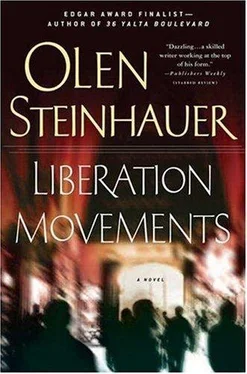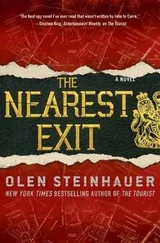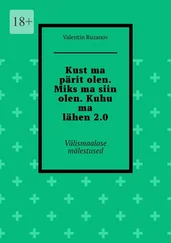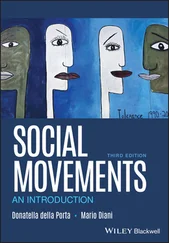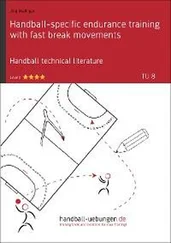So I check into the dark but cheap Sultan Inn and take a nap on the small bed until evening, when I wash and go out.
It’s inevitable that I’ll return-it’s the old Militia cliche: A criminal always returns to the scene of the crime. So I find myself again in the lobby of the Hotel Erboy, where I struggled with the English in the Herald Tribune before following Peter Husak up to his room. I pick up another copy.
A desk clerk smiles at me as I pass him on my way to the elevator, which takes me to the fifth floor and a set of stairs leading to a small rooftop bar and restaurant half full of foreigners sipping drinks and stretching tired legs. I climb onto a stool and order rak?. The bartender, a small, efficient man, produces it quickly, alongside a dish of mixed nuts.
Here is a surprise. From the front page of the newspaper, General Secretary Tomiak Pankov glares back at me like a stern father. The headline tells me that he vehemently denies charges of funding terrorists leveled at him by a Swedish law-enforcement officer more than a week ago at an Interpol conference here in Istanbul.
That conference. The one Libarid never made it to.
Socialism, says our great leader, has no need of violence or subterfuge. It is recognized by all the world as our only hope for peace and the salvation of our natural environment.
I fold the paper, unsure whether I should smile at that. And I know then what that hesitation is-it’s the weight of knowing that I’ll soon be returning home. As if to remind me, a melancholy prayer begins from the glowing minarets of the Aya Sofia.
Behind me are small tables filled with strangers whom I, in my naivete, assume are simple, only because I don’t know their secrets. And to them, I’m a simple face at the bar, nothing more.
Then I spot a face I know, and the surprise almost makes me drop my glass. My first impulse is to flee, but I’ve grown to hate my impulses. So I take my glass over to a table at the edge, where a handsome man is staring morosely into his beer, ignoring the vista of nighttime Istanbul.
“Hello, Gavra.”
He hasn’t shaved in a few days. His pink eyes show he’s been crying, and I wish I hadn’t disturbed him. He stands, hands flailing at his sides. “Katja.” His lips work the air a moment. “What are you-”
“May I?”
“Of course.” He waves at the other seat and settles back down.
“I’m on vacation,” I say.
He nods, but he looks very confused. “Me, too.”
“Are you all right?”
Gavra takes a drink, then wipes his mouth with the back of his hand as the muezzin’s prayer continues. “Not really.”
“Can I help?”
He shakes his head. “I’ll survive.”
For a while we only drink and he smokes, both of us looking everywhere except at one another. Then I bring up something I think will be easy for us to discuss. “Did you and Brano ever figure out that hijacking?”
He continues to not look at me, but I can see tears returning. “We’ll never figure it out.”
“And Adrian Martrich?”
Gavra’s taken by a sudden coughing fit, so I can barely make out his answer: “He’s dead.”
I don’t ask how Adrian died, because the fact is I’m not even interested. People die every day, and the life I led a long time ago, before killing Peter Husak-the life I’ll soon return to-carries no weight for me now. It will soon, but not yet, and I like this disconnection.
Once he’s recovered, he wipes his eyes and says, “I don’t know what to believe anymore.”
“What do you mean?”
He doesn’t answer. Instead, he puts his hand on mine and squeezes. Although I’ve always been fond of Gavra, this touch disturbs me in a way I can’t quite place. Perhaps because the prayer is finished, and we’re in silence. I find myself thinking that, if all I had to worry about was solving some damned case, I’d be skipping by now. He says, with surprising conviction, “Katja, I just want to be home again.”
I smile, as if I understand.
Also by Olen Steinhauer
